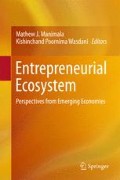Abstract
Green entrepreneurship must be embedded in the present industrial paradigm to have sustainable growth. The top ranking companies of the world have started turning green through corporate social responsibility and other business drives. It is indispensible for manufacturing, supply chain, information technology, and retail companies to resort to green practices. Thus, the potential of green entrepreneurship in near future is huge, both for new entrants and the established ones. This chapter includes in-depth analysis of positive and negative aspects of starting and running green business. Study has outlaid problems relating to the rigid procedural requirements encountered by the entrepreneur in starting a green venture. A clear picture of prevalent financial scenario viz., the role of venture capitalism, angel funding, and banks is investigated to highlight opportunities for Foreign Direct Investments (FDI) in green sector in India. Government, university, and corporate R&D in the sector have been thoroughly scanned. Technology Business Incubators (TBIs) have been surveyed to find out their contribution to the Green Sector Development in the country. Government policies, programs, and subsidies for green entrepreneurship development have been critically analyzed. Close surveillance has enabled categorization of government procedures and regulations as facilitators/barriers for entrepreneurship. Role of early stage/entrepreneurship/technology education in creating entrepreneurial attitudes for green sector has been evaluated against the global benchmarks. This chapter summates the viewpoints of academicians, industrialists, entrepreneurs, practitioners, and government officials to draw the important conclusions. All the necessary elements, i.e., literature viz. white papers, articles, case studies; instrument viz. surveys, interviews, site visits; analysis viz. statistical analysis, factor analysis have been adopted. This chapter deeply researches the aspects relating to India and it caters broadly to those of some other emerging economies. It has been figured out that there is both lack of support and knowledge about green entrepreneurship. The existing infrastructural and informational gap could be met to great extent by developing a public–private partnership model. Whole some the chapter is full of argumentation, analytics, definitions, comparison and contrast, cause and effect, reports and data, and lastly interpretation to draw the conclusions.
We sincerely acknowledge almighty, our families, friends, and all the respondents. We thank Prof. P.B. Sharma, Vice Chancellor, Delhi Technological University for Knowledge Park infrastructure support and guidance. We also thank SIDBI, IIT Delhi for infrastructure.
Access this chapter
Tax calculation will be finalised at checkout
Purchases are for personal use only
References
Al-Mabrouk K, Soar J (2009) An analysis of the major issues for successful information technology transfer in Arab countries. J Enterp Inf Manage 22(5):504–522
Atakan MGS, Eker T (2007) Corporate identity of a socially responsible university: a case from the turkish higher education sector. J Bus Ethics 76:55–68
Atherton A, Hannon PD (2006) Localized strategies for supporting incubation: strategies arising from a case of rural enterprise development. J Small Bus Enterp Dev 13(1):48–61
Austin JE, Reficco E (2009) HBS, working paper “corporate social entrepreneurship”. http://www.hbs.edu/research/pdf/09-101.pdf
Branstad A (2011) A study of management tasks and stakeholders in a hybrid corporate incubator. Eur J Innov Manage 13(3):294–312
Chen YS (2011) Green organizational identity: sources and consequences. Manag Decis 49(3):384–404
Dees JG (2007) Taking social entrepreneurship seriously: uncertainty, innovation, and social problem solving. Society 44(3). http://www.brookings.edu/global/aspen/2007dees.pdf
Drucker PF (1985) Innovation and entrepreneurship. Harper & Row, New York
Gao Y (2011) CSR in an emerging country: a content analysis of CSR reports of listed companies. Baltic J Manage 6(2):263–291
Gertner D (2011) University industry collaboration: a CoPs approach to KTPs. J Knowl Manage 15(4):625–647
Ghosh S (2011) Participation in the green power partnership. Int J Sustain High Educ 12(4):306–321
Gibb AA, Davies LG (1991) Methodological problems in the development and testing of a growth model of business enterprise dev In: Davies LG, Gibb AA, (eds) Recent research in entrepreneurship, Avebury, Aldershot, England pp 286–323
Harrison D, Seiler M (2011) The political economy of green office buildings. J Property Investment Finance 29(4/5):551–565
Hisrich RD, Peters MP (1998) Entrepreneurship, 4th edn. Irwin/McGraw Hill, Boston
Johnston L (2011) Recognizing “open innovation” in HEI-industry interaction for knowledge transfer and exchange. Int J Entrepreneurial Behav Res 16(6):540–560
Maritz A, Brown C, Shieh CJ (2011) A blended learning approach to entrepreneurship education. Paper presented at the 8th AGSE international entrepreneurship research exchange, Melbourne, Australia
McAdam M, Marlow S (2008) A preliminary investigation into networking activities within the university incubator. Int J Entrepreneurial Behav Res 14(4):219–241
Mets T (2009) Creating business model for commercialization of university research. Organizacijø Vadyba: Sisteminiai Tyrimai, Kaunas 51:83–94
Rae DM (1997) Teaching entrepreneurship in Asia: impact of a pedagogical innovation. Entrepreneurship Innov Change 6(3):193–227
Report of IAEA (2005) Energy indicators for sustainable development: guidelines and methodologies. http://www-pub.iaea.org/MTCD/publications/PDF/Pub1222_web.pdf
Sabbaghi O (2011) The behavior of green exchange-traded funds. Manag Finance 37(5):426–441
Schaper M (ed) (2010) Making ecopreneurs—developing sustainable entrepreneurship. Gower Publishing Limited, Surrey
Sharma SK, Srinivasan R (2008) Perception of foreign players for effective positioning in India. Manag Decis 46(10):1465–1481
Terjesen S, Sullivan SE (2011) The role of developmental relationships in the transition to entrepreneurship. Career Dev Int 16(5):482–506
Vincett PS, Farlow S (2008) Start-a-Business: an experiment in education through entrepreneurship. J Small Bus Enterp Dev 15(2):274
Yigitcanlar T, Velibeyoglu K, Martinez-Fernandez C (2008) Rising knowledge cities: the role of urban knowledge precincts. J Knowl Manag 12(5):8–20
Author information
Authors and Affiliations
Corresponding author
Editor information
Editors and Affiliations
Rights and permissions
Copyright information
© 2015 Springer India
About this chapter
Cite this chapter
Sharda, A., Goel, A., Mishra, A., Chandra, S. (2015). Green Entrepreneurship in India: Global Evaluation, Needs Analysis, and Drivers for Growth. In: Manimala, M., Wasdani, K. (eds) Entrepreneurial Ecosystem. Springer, New Delhi. https://doi.org/10.1007/978-81-322-2086-2_11
Download citation
DOI: https://doi.org/10.1007/978-81-322-2086-2_11
Published:
Publisher Name: Springer, New Delhi
Print ISBN: 978-81-322-2085-5
Online ISBN: 978-81-322-2086-2
eBook Packages: Business and EconomicsBusiness and Management (R0)

